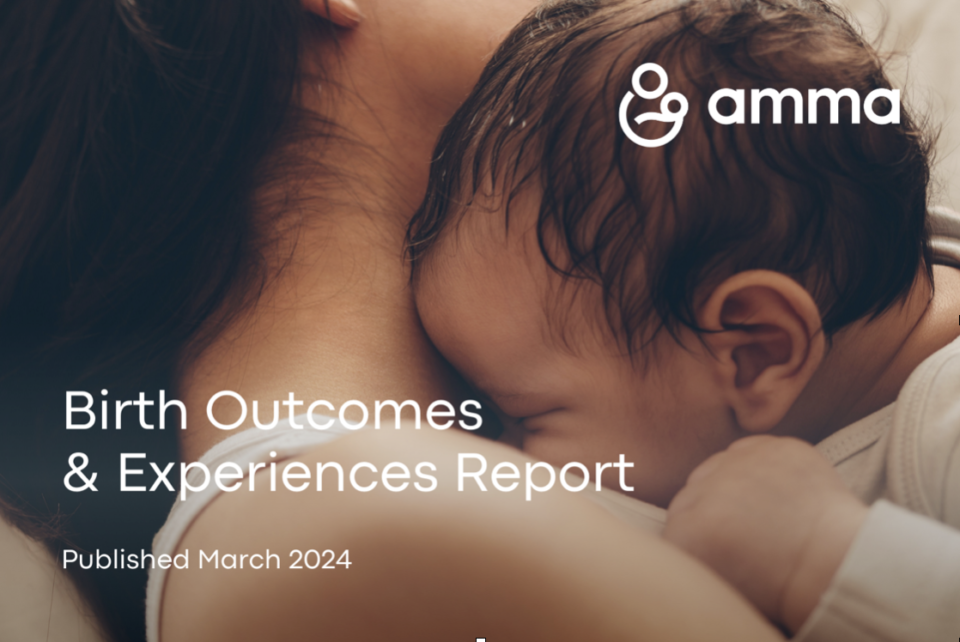Inequity in maternity care is still of concern across all areas of services. Maree Aldam, CEO, and Amanda Purdie, Head of Advocacy and Communications Amma Birth Companions share their recent report that adds to the evidence and points out that so much more needs to be done.
_________________________________________
At Amma Birth Companions, our mission is rooted in the belief that every person giving birth deserves access to maternity care that not only safeguards their physical and emotional well-being but also upholds their dignity and respect. However, as our recently published ‘Birth Outcomes & Experiences Report’ shows, refugee, asylum-seeking, and migrant women are facing stark inequities within maternity care.
Why this report?
Since Amma’s inception in 2019, we have been collecting data on our clients’ birth experiences to better support and advocate for them. Over time, we’ve felt a growing ethical responsibility to share these insights and amplify the voices of those we support. This report is part of our ongoing effort to advocate for systemic change and spotlight inequalities in perinatal care, especially for asylum-seeking and refugee mothers and survivors of trafficking—an area where data has been sorely lacking in Scotland.
Key findings
Our report analysed the birth experiences of 100 clients supported by Amma over a two-year period. The data revealed:
- Instances of practice issues and discrimination were noted in over a third (37%) of recorded cases, citing issues including delayed pain relief, restricted choice, disrespectful behaviour, and misinformation.
- Three in four (74%) of those who required an interpreter faced issues including a lack of availability; staff understanding and willingness to use interpreters; and technical issues.
- Induction rates rose from 46% in 2021 to 48% in 2022, 11 percentage points higher than NHS Greater Glasgow & Clyde figures. The average gestational age at the time of induction was 38 + 5 weeks.
- The average Caesarean section rate was 51%, spiking from 38% in 2021 to 60% in 2022. In 2022, Amma’s rate of Caesarean sections was 18 points higher than NHS figures, also surpassing overall rates reported by Public Health Scotland when broken down by ethnicity.
Addressing systemic failings
Our findings sit within the broader context of the midwifery crisis and racialised health inequalities. We’re not seeking to prove these disparities exist—ample evidence from Public Health Scotland, MBRRACE-UK and others already confirms this. Instead, we aim to provide nuanced insights into the Glasgow context, aligning with initiatives like the Scottish Government’s Short-Life Working Group on Racialised Inequalities in Maternity Care. By contributing to these efforts, we hope to drive targeted interventions and influence policies that address and alleviate these disparities.
We also acknowledge and deeply sympathise with the challenges of working within a strained and underfunded maternity service, where staff are grappling with burnout. Some of the challenges faced by our clients reflect the widely reported crisis in maternity care and maternity staffing.
It’s all too easy to blame midwives, but with so many midwives working in survival mode, they simply can’t be expected to shoulder the full responsibility of enacting change. This is why, as part of our recommendations, we’re calling on the government to urgently address years of under-investment in maternity healthcare.
The stories behind the numbers
The most revealing aspects of our report are the personal stories behind the statistical data—stories of limited choices, poor communication, and the application of high-risk labels causing significant fear and anxiety.
Our report also shows that our clients are undergoing inductions and C-sections at a much higher rate than the overall figures reported by Public Health Scotland—even when broken down by ethnicity. And although it’s not our place to dispute clinical recommendations, the stories captured in the report show that there are complex dynamics involved in decision-making around interventions—including the balance between patient autonomy and medical recommendations, the impact of effective communication, and the emotional toll of these discussions on pregnant women who are already grappling with histories of trauma and the stress of the asylum process.
We’re concerned that attempts to reduce racialised disparities and lower risk—whilst well-intentioned—are increasingly focused on interventions like induction as the solution. It’s important to balance the offer of interventions against other crucial aspects of care, including the potentially negative impact of these interventions on mothers’ and babies’ physical and emotional wellbeing.
The Importance of Communication
It is crucially important that everyone entering maternity services can access information and make and express choices in their preferred language. Without adequate interpreting, it simply isn’t possible for individuals to fully understand the information being presented and make informed choices about their care. In some cases, this means that people agree to interventions such as inductions without fully understanding why it is being offered, what the procedure involves, as well as the risks, benefits, or alternatives.
A lack of interpreting or inadequate interpreting can also cause significant fear and anxiety for people accessing healthcare. Kadija’s story, included in the report, highlights just how confusing and scary it is to undergo medical treatment without understanding why it’s happening.
A call to action
Our report underscores the urgent need for a more equitable maternal care system—one that values the wellbeing of healthcare workers and ensures person-centred care for all birthing individuals. For this to happen, there needs to be collaborative solutions that involve multiple stakeholders and significant investment in maternity services.
At Amma Birth Companions, we remain committed to advocating for change and playing our part in creating a more just and compassionate maternity care system. We urge you to join us.
For more information about Amma Birth Companions and ways to get involved, visit www.ammabirthcompanions.org or email info@ammabirthcompanions.org
Maree Aldam, CEO,
and Amanda Purdie, Head of Advocacy and Communications,
Amma Birth Companions
April 2024


